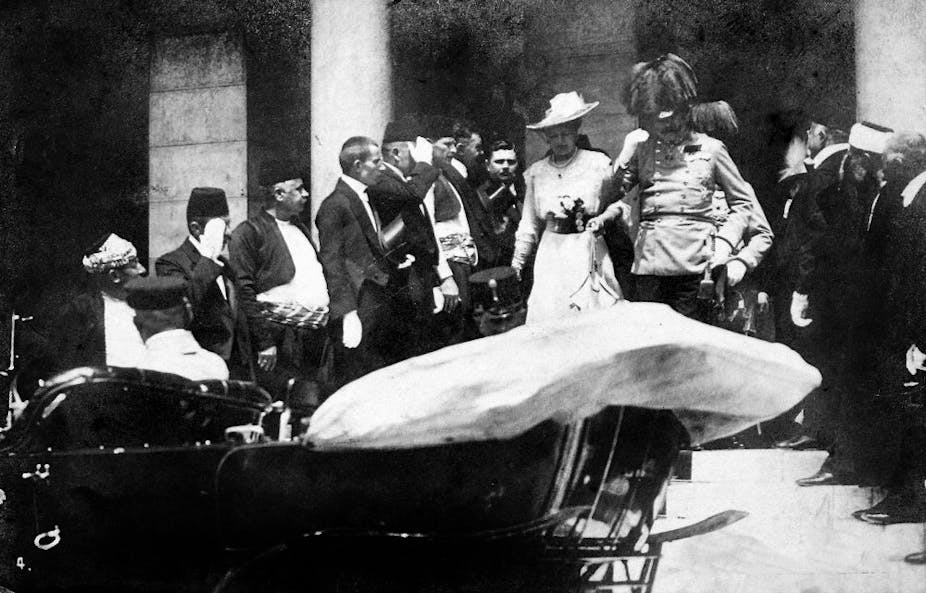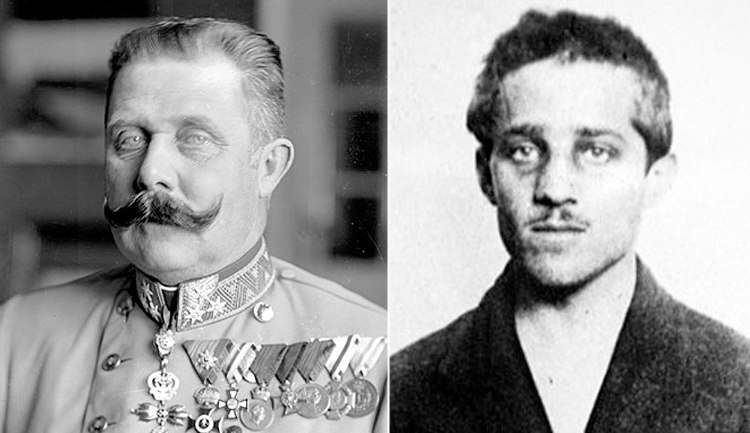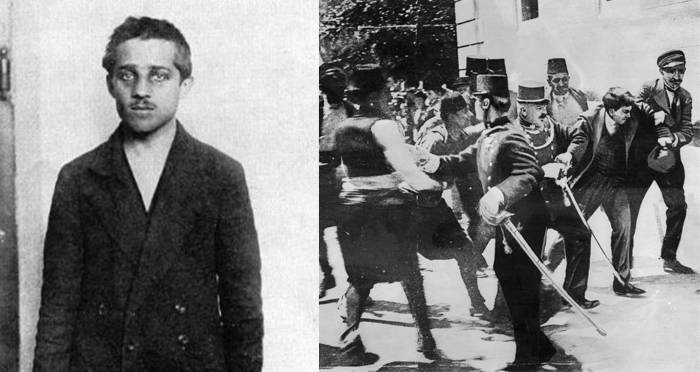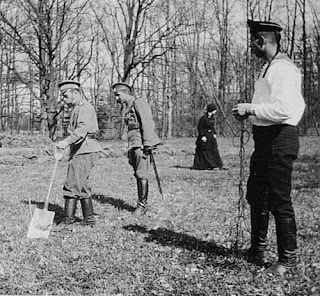
Franz Ferdinand heir to the Hapsburg throne was a liberal reformer. He sought to negotiate a peaceful path to limited self-rule for constituent nationalities within the country. Right-Wing Extreme Nationalist Assassin Princip could not have cared less at the consequences of his assassination. 20,000,000 dead during WWI and another 20,000,000 dead Russians in the Russian Civil War which followed.


Dragutin Dimitrijević was born in Belgrade in 1876. At sixteen Dimitrijević went to the Belgrade Military Academy. A brilliant student, Dimitrijević was recruited into the General Staff of the Serbian Army immediately after his graduation.
Captain Dimitrijević and a group of junior officers planned the assassination of the autocratic and unpopular king of Serbia. On 11 June 1903, the group stormed the royal palace and killed both King Alexander and his wife Queen Draga. During the attack Dimitrijević was badly wounded, and, although he eventually recovered, the three bullets from the encounter were never removed from his body.
The Serbian parliament described Dimitrijević as "the saviour of the fatherland" and he was appointed Professor of Tactics at the Military Academy. He visited Germany and Russia where he studied the latest military ideas. During the Balkan Wars (1912–13), Dimitrijević's military planning helped the Serbian Army achieve several important victories.
A Monument to Evil Dragutin Dimitrijevć "Apis", Tomb in Memorial park of Zeitenlik, Thessaloniki.
Unknown to Dimitrijević, major Vojislav Tankosić was informing Nikola Pašić, the prime minister of Serbia about the plot. Although Pašić supported the main objectives of the Black Hand group, he did not want the assassination to take place, as he feared it would lead to a war with Austria-Hungary. He therefore gave instructions for Gavrilo Princip, Nedeljko Čabrinović and Trifko Grabež to be arrested when they attempted to leave the country. However, his orders were not implemented, and the three men arrived in the Condominium of Bosnia and Herzegovina, where they joined forces with fellow conspirators, Muhamed Mehmedbašić, Danilo Ilić, Vaso Čubrilović, Cvjetko Popović, Miško Jovanović and Veljko Čubrilović.
After the assassination of Archduke Franz Ferdinand on 28 June 1914, several Black Hand members, under interrogation by the Austrian authorities, claimed that three men from Serbia (Dimitrijević, Milan Ciganović, and Major Voja Tankosić) had organised the plot.
On July 23, 1914, the Austro-Hungarian government sent its July Ultimatum to the Serbian government with a lengthy list of ten different demands. In his response on July 25, 1914, Nikola Pašić, the Serbian prime minister, accepted all the points of the ultimatum except point #6, demanding Serbia to allow an Austrian delegation to participate in a criminal investigation against those participants in the conspiracy that were present in Serbia. Three days later the Austro-Hungarian Empire declared war on Serbia.
In 1916, Dimitrijević was promoted to colonel
Nikola Pašić decided to get rid of the most prominent members of the Black Hand movement, by then officially disbanded. Dimitrijević and several of his military colleagues were arrested and tried on false charges blaming them with attempted assassination of regent Aleksandar I Karadjordjevic. On May 23, 1917, following the so-called Salonika Trial, Dimitrijević was found guilty of treason and sentenced to death. A month later, on June 24,1917 he was executed by firing squad.
In 1953, Dimitrijević and his co-defendants were all retried by the Supreme Court of Serbia and found not guilty, because there was no proof for their alleged participation in the assassination plot.
Wikipedia
Nicholas II, Czar of Russia, was executed along with his family by the Bolsheviks. Nicholas was the instigator of the Hague Conventions, precursor of the Geneva Conventions. Which established and outlawed war crimes, atrocities and crimes against humanity.
Dragutin Dimitrijević was guilty of lighting the fuse which ignited World War I. A name which live in infamy. For some horrible reason even the assassin who brought this nightmare upon the world has been memorialized:
The house where Gavrilo Princip lived in Sarajevo was destroyed during World War I. After the war, it became a museum in the Kingdom of Yugoslavia. Yugoslavia was conquered by Germany in 1941 and Sarajevo became part of Fascist Croatia. The Croatian Ustaše destroyed the house again. After the establishment of Communist Yugoslavia in 1944, the house of Gavrilo Princip became a museum again and there was another museum dedicated to him within the city of Sarajevo. During the Yugoslav Wars of the 1990s, the house of Gavrilo Princip was destroyed a third time by the government; no attempts to rebuild it have yet been announced. The Gavrilo Princip museum has been turned into a museum dedicated to Archduke Ferdinand and the Habsburg monarchy. Prior to the 1990s the site on the pavement on which Princip stood to fire the fatal shots was marked by embossed footprints. These were removed as a consequence of the 1992-1995 war in Bosnia and the perception of Princip as having been a Serb nationalist. Later, a simple wooden memorial was placed near the site of the assassination with the words "May Peace Prevail on Earth" in Bosnian, Serbian and English. There is a plaque in front of the museum at the spot where Gavrilo Princip stood when he fired the shots.
In 1902 Alexander's right-wing relative Peter Кarađorđević was proclaimed king by followers, and Alexander responded by organizing a military cabinet and suspending the constitution. Radicals began to plot the King's assassination.
The real evidence of the evil of Dragutin Dimitrijević is the 1903 massacre of Serbian Royal Family. King Alexander I was a liberal reformer who was willing to talk to the Austrian/Hapsburg Hapsburg family to protect Serbians/Slavs inside the Hapsburg lands. There is little doubt from 1900 that Dragutin Dimitrijević and his Serbian Military Intelligence/"Blackhand" Terrorist Group was to start a war, eventually leading to the deaths of 20,000,000 men, women, children and babies in World War One.
One of the most evil acts in the mankind is not something to celebrate, shame on anyone who so chooses.
One of the most evil acts in the mankind is not something to celebrate, shame on anyone who so chooses.





























